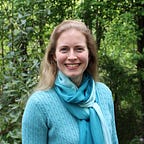McCluney and Browning attend Rare Book School
When you think of summer camp, visions of horseback riding, swimming, and crafts may come to mind. But not for two University Libraries employees, who had the chance to attend a different sort of summer camp — Rare Book School (RBS) at The University of Virginia, one of the premiere continuing education programs devoted to the history of the book.
During the first week of June 2019, Shannon McCluney attended “Rare Book Cataloging” and Greta Browning attended “The History of European and American Papermaking.” Both were accepted through a competitive application process.
Rare Book School “provides continuing-education opportunities for students from all disciplines and skill levels to study the history of written, printed, and digital materials with leading scholars and professionals in the field.” Courses meet approximately six hours for five days, and the school offers extracurricular book-related activities, such as evening lectures and Charlottesville Bookseller Night when area booksellers welcome RBS students during evening hours.
McCluney and Browning plan to incorporate their new knowledge into their daily work. McCluney is a Library Specialist and a Cataloger in Resource Acquisition and Management. In the Rare Book Cataloging course taught by Deborah J. Leslie, she learned how to apply the rules for Descriptive Cataloging of Rare Materials (Books).
Her course heavily emphasized hand-press era books with some examples of nineteenth-century books. She plans to use her training for cataloging DCRM(B) compliant records for the Rhinehart Collection on British Studies and other rare books in Special Collections.
Browning is an Associate Professor and the Reference Archivist/Librarian and Curator of the Rhinehart Collection on British Studies in Special Collections. In the course that she took about the history of paper, taught by Timothy D. Barrett and John Bidwell, she learned about the history of the paper trade, how papermaking spread to Europe and America, the basics of how to identify watermarks, and the labor history of the paper trade in Europe and America.
She also had a hands-on experience in making paper using European and Japanese methods. As paper is one of the few inventions not known in ancient civilizations, it is a foundational, and often silent, piece of evidence that the modern world has of past industry and human labor. She plans to apply her new knowledge in instruction sessions with undergraduate and graduate students, in Special Collections exhibits and outreach activities, and in her curatorial duties.
